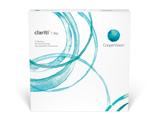
You may not spend a lot of time thinking about your contact lenses, but keeping your eyes healthy is your eye doctor’s top priority. Technology is always evolving and improving, yet many eye care professionals (ECPs) admit that they worry about their patients’ eyes—even if they’re wearing 1 day disposable lenses. In fact, 77% of ECPs sometimes worry that their 1 day hydrogel lens wearers are not getting all the oxygen they require!1
The Benefits of 1 Day Lenses
Daily disposables, also known as 1 day lenses, have features that may ease many of your doctors’ concerns about your contact lens wearing habits. For example, not all patients clean their reusable lenses as regularly or as thoroughly as they should, which could lead to very serious problems. Some people also may try to stretch out the life of their lenses, and fail to replace them as frequently as they should. This is exactly the kind of thing that puts you at risk and keeps your eye doctor up at night. By prescribing a lens that is replaced daily, your doctor can rest assured, knowing that lens maintenance won’t compromise your health.
Not all 1 Day Lenses Are Alike
Unfortunately, how frequently you replace your lenses isn’t the only variable that affects eye health. What your lenses are made of matters too. Most frequent replacement lenses (the lenses that require cleaning) are made of silicone hydrogel. Indeed, on average, ECPs fit 88% of their monthly and two-week contact lens wearers in silicone hydrogel lenses.2
Due to its increased oxygen transmissibility, silicone hydrogel offers patients a healthier* lens-wearing experience; but this advanced material hasn’t always been available to patients who want to be able to throw out their lenses every night. Fortunately, scientists and contact lens manufacturers have found ways to make silicone hydrogel affordable even to patients who wear 1 day disposable lenses. This is great news for doctors and patients alike. In fact, when asked about how to safeguard patient eye health related to contact lens wear, 92% of ECPs agree that 1 day silicone hydrogel lenses are the best choice.1
Why Wait?
Eighty-two percent of ECPs believe that silicone hydrogel should be the standard of care for 1 day contact lens patients and 87% say silicone hydrogel material should be the first choice of material for daily disposable lenses.1 So why aren’t all contact lens wearers told to wear these lenses? There are a few reasons. For example, some people require customized lenses for specific eye conditions, special vision needs, or out of the ordinary corneal shapes.
More often, however, the reason patients don’t have access to 1 day silicone hydrogel lenses is because doctors hesitate to ask their patients to upgrade to a lens that might cost a bit more that they’re used to spending. That being said, almost all ECPs (95%) agree that if cost were equivalent they would choose silicone hydrogels over hydrogels for their daily disposable patients.1
Would this matter to you? More importantly, would you want to be given the choice to decide for yourself? Whether 1 day silicone hydrogel lenses are right for you or not, you deserve to be in the driver’s seat. Research shows that over two-thirds (68%) of consumers say they expect their ECP to recommend the healthiest option regardless of cost.3
If this sounds like you, ask your doctor about 1 day silicone hydrogel lenses at your next visit. Your doctor may be able to offer rebates and can also help you determine how much you’ll save on lens cleaning products if you’re switching to a 1 day lens for the first time.
CooperVision's portfolio of 1 day silicone hydrogel contact lenses offers a lens for virtually every eye—and every budget. From the breadth of the clariti® 1 day family to the uncompromising performance of MyDay®, CooperVision provides the options needed to meet the demands of almost any patient.
For more information, visit PrescribeOxygen.com
*With higher oxygen permeability than hydrogel materials, silicone hydrogel contact lenses minimize or eliminate hypoxia-related signs and symptoms during lens wear.
Nothing in this blog post is to be construed as medical advice, nor is it intended to replace the recommendation of a medical professional. For specific questions, please see your Eye Care Practitioner.
1. ECP perction of the benefits of 1-day silicone hydrogels. February 2018. Cello Health Insight. Data on file. Survey carried out online in US, UK, and Japan. Total sample size n = 300 (100 ECPs in each country).
2. Industry third-party data.
3. Silicone hydrogel lenses. 2018. YouGov Plc. Total sample size was 1520 adults who wear contact lenses. Fieldwork undertaken March 26th - Apr 3rd 2018. Survey carried out online.





